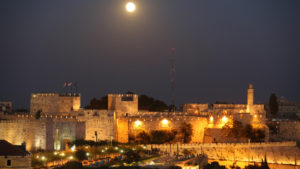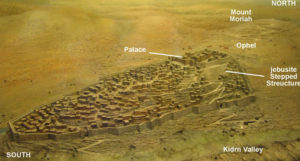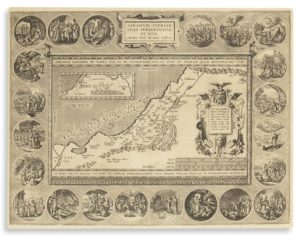Jerusalem – the Messiah Connection

Jerusalem, an ancient, world-famous city with no natural wealth or strategic value – no harbor, no navigable waterway, no major trade routes, militarily isolated with valleys on all four sides, not even a natural water source within its walls – an improbable city in the desert.[1]
Happenings of great religious significance began at the place about 1000 years before the future city would ever come to be called Jerusalem. Its entire existence is based almost solely on its religious heritage.
A 2000-year history preceded the era of Jesus of Nazareth. It produced a legacy of kings, births, deaths, prophecies, angels, sacrifices, blessings, wars, exile and restoration.
It all began when one day God instructed Abram to move from Haran in Canaan to an unnamed location. By faith, he and his family resettled in a strange land near Salem whose King was Melchizedek and also a priest of God.[2]
During these years, God blessed Abram, changed his name to Abraham and promised he would become the father of a great nation.[3] His miraculous-born son, Isaac, would be the first step in fulfilling God’s promise.
Isaac would pass on his father Abraham’s blessing to his own son, Jacob whose name was changed by God to Israel.[4] Many years later Israel, along with his 11 sons and their families, moved to Egypt under the protection of his long lost son, Joseph, who had become the second most powerful man next only to Pharaoh.
Over the next 400 years, the 12 tribes of the Children of Israel became slaves of Egypt. Meanwhile back in Canaan during the absence of the clan of Israel, the Jebusites occupied Salem coming to be known as Jebus.[5]
Fleeing Egypt through the Red Sea, the Hebrews arrived at Mt. Sinai. Five big promises in the Law given to Moses atop Mt. Sinai were tied to the place. All required a city – a new homeland for the city; the throne for a king; a permanent place for His Name to dwell; a permanent place to observe the Feasts; and the place of the judgment seat of Israel.
God just didn’t yet say exactly where the place would be.[6]As a visual sign of His promise, God sent an angel in the form of a pillar of cloud by day and fire by night to lead them to the place that He had chosen.
First fulfillment of the five big promises was a return to the land of Abraham, “The Promised Land,” when the Hebrews crossed the Jordan River. Hinting at the city location of the place, God twice called out the occupants of Salem – the Jebusites:[7]
EX 23::20, 23 “See, I am sending an angel ahead of you to guard you along the way and to bring you to the place I have prepared.… “For My angel will go before you and bring you in to the land of the Amorites, the Hittites, the Perizzites, the Canaanites, the Hivites and the Jebusites…”(NASB)
EX 33:1-2 “Then the LORD spoke to Moses, “Depart, go up from here, you and the people whom you have brought up from the land of Egypt, to the land of which I swore to Abraham, Isaac, and Jacob, saying, ‘To your descendants I will give it.’” I will send an angel before you and I will drive out the Canaanite, the Amorite, the Hittite, the Perizzite, the Hivite and the Jebusite.” (NASB)
A kingdom would become the second of the five big promises tied to the place.[8] God intimated to Moses the Hebrews would one day want a king to rule them like the other nations and when that time came, He would choose the king from among their own people.
As predicted, centuries later the people wanted a king to lead them like the other nations. Instead of God choosing their king, the Hebrews chose their own first king, Saul, by casting lots.[9]
As time would bear out, the people’s choice failed. Saul did not seek God’s guidance and it would cost the lives of himself and his three sons on the battlefield. With Saul’s failed kingship and death, Israel accepted God’s choice for a new king, David, son of Jesse of Bethlehem.[10]
Promise of a kingdom for Israel had only been partially fulfilled. David was a king without a place for his throne although he had an eye on Jebus, also known as Zion.
Problem was that the fortified city was occupied by the Jebusites. Up to this point, every attempt by the fledgling nation to defeat the Jebusites had been unsuccessful.[11]
David had become famous as a skilled warrior and giant slayer while serving in King Saul’s army. As King himself, David gathered the Hebrews from the surrounding areas to form a large army, went to war with Jebus and took the city.

Salem – Jebus – Zion was now called the City of David coming to be known as the City of Jerusalem. A city with no logical reason for existence, Jerusalem became the capital of Israel and the throne of King David fulfilling two more of God’s promises.
Fourth of the promises was fulfilled in Jerusalem which encompassed Mount Moriah. Built by King Solomon on Mt. Moriah, the Temple became the place where the Passover celebrated at its appointed time.[12]
Next to the Chamber of Hewn Stone where the Sanhedrin routinely convened became the place of the highest court in the land, the Judgement Seat of Israel. It was there final judgments were made to enforce God’s Law for criminal offenses that included capital death cases.[13]
An interwoven trail of blessings, testing of faith, much drama, prophecies made and fulfilled over the course of a millennia, all climaxed with the glory days of Jerusalem under King David. Splendor would be short lived – the end of David’s reign marked the beginning of the nation’s deterioration.
Spiraling out of control, the downhill slide led to the point all would be eventually lost. Jerusalem with its Temple was destroyed by Nebuchadnezzar and its select inhabitants were exiled to Babylon.
A millennium after its height of glory during David’s reign, a comeback for Jerusalem came under King Herod. Jesus of Nazareth appeared on the scene, born in the same town as David, Bethlehem, and in the royal lineage of King David.
Consistent with multiple Messiah prophecies, his life culminated with Jesus being placed on trial in Jerusalem and crucified, consistent with multiple Messiah prophecies. Were they just multiple coincidences or was Jesus the promised Messiah?
Updated February 3, 2o24.
This work is licensed under a Creative Commons Attribution-NonCommercial-NoDerivatives 4.0 International License.
REFERENCES:
[1] Gersch, Lili Kalish. MyJewishLearning. “Whose Jerusalem?” photo. n.d. <https://www.myjewishlearning.com/article/whose-jerusalem> “Jerusalem .” New World Encyclopedia. “Jerusalem Archaeological Sites: Biblical Water Systems.” Jewish Virtual Library. 2014.
[2] Genesis 11-15. “Historical Timeline.” The Biblical Zionist. 2009. <http://www.biblicalzionist.com/timeline.htm> Uittenbogaard, Arie. “Salem meaning | Salem etymology.” <http://www.abarim-publications.com/Meaning/Salem.html#.U5SQqCjyTih> Josephus. Wars of the Jews. Book VI, Chapter X.
[3] Genesis 17.
[4] Genesis 32, 35.
[5] I Chronicles 11; Judges 1, 19; Joshua 15; Psalms 76.
[6] Exodus 23, 33; Deuteronomy 12, 17.
[7] Deuteronomy 3:12-22. Ryrie Study Bible. Ed. Ryrie Charles C. “Laws relating to conquests” ref. Ex. 23:20-33.
[8] Deuteronomy 17.
[9] I Samuel 10.
[10] I Chronicles 11.
[11] II Samuel 5:6; I Chronicles 11. “Zion.” Encyclopædia Britannica. 2024. <https://www.britannica.com/place/Zion-hill-Jerusalem>
[12] I Chronicles 17:8-13. Josephus, Antiquity of the Jews, Book VII, Chapter III.1-2. “The Temple.” The Victor’s Place. image. Feb. 2. ? <https://images.search.yahoo.com/yhs/search;_ylt=AwrCwOUslAdjzRoASQ0PxQt.;_ylu=Y29sbwNiZjEEcG9zAzEEdnRpZAMEc2VjA3BpdnM-?p=The+Temple%2C+Jerusalem&type=yhs-adk_sbnt_appfocus1_sm_ff¶m1=20210118¶m2=00000000-0000-0000-0000-000000000000¶m3=searchmanager_%7EUS%7Eappfocus1%7E¶m4=%7Efirefox%7E%7E&hsimp=yhs-adk_sbnt&hspart=adk&grd=1&ei=UTF-8&fr=yhs-adk-adk_sbnt#id=96&iurl=https%3A%2F%2Fvhoagland.files.wordpress.com%2F2021%2F02%2Fdsc00129.jpg&action=click>
[13] Exodus 18; Deuteronomy 17. Edersheim, Alfred. The Temple – Its Ministry and Services. 1826 -1889. <https://ccel.org/ccel/edersheim/temple/temple.i.html> Shachter and Freedman. “Introduction to Sanhedrin.” Soncino Babylonian Talmud. <https://israelect.com/Come-and-Hear/sanhedrin/index.html> Ariel, Yisrael. “The Chamber of the Hewn Stone.” The Temple Institute. 2014. <https://www.templeinstitute.org/illustrated/hewn_stone_description.htm> Ariel, Yisrael. “Blueprints for the Holy Temple.” <http://www.templeinstitute.org/blueprints-for-the-holy-temple.htm>

